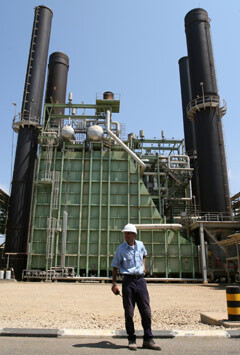The Electronic Intifada 22 August 2007

Palestinian engineers from the Gaza Generating Company examine an electrical plant in Nusseirat, in the central Gaza Strip, August 18, 2007. (Wissam Nassar/MaanImages)
“Without electricity, we will face a real environmental and humanitarian disaster,” said Munzer Shublak, the head of Coastal Municipalities Water Utilities. He raised concerns that sewage would either end up flowing onto the streets or there might be another overflow of the plant, as occurred in April. He said they only had enough fuel for their generators for a few days, after which they would have trouble treating sewage.
“We will also not be able to pump out clean water without power,” he added.
Power shortages worsened when Israel closed the Nahal Oz crossing for fuel supplies on 16 August over “security concerns.” In addition, the European Commission (EC) announced a decision to stop funding fuel for the city’s power plant on 19 August, even though Israel had agreed to reopen the crossing.
With the EC announcement, the Gaza Generating Company turned off its last generator, having cut back production the previous two days. The company supplies about a quarter of Gaza’s electricity, with the rest coming from Egypt and Israel.
Health concerns
The Al Mezan Centre for Human Rights, a Gaza-based non-governmental organization, warned that “hospitals, drinking water and sanitation” may all be affected by the shortages.
As outages have increased, hospitals are becoming more reliant on generators. According to World Health Organization (WHO) estimates, there is enough fuel for them to last until 23 August. As generators are already the backup system, the hospitals could be left without any power if they break down.
Compounding the problems, medical trade unions have called for partial strikes this week, in protest at personnel changes made by Hamas, and against the use of force against protesters some weeks ago.
EC wants Hamas assurances on use of funds
The EC said Hamas was diverting electricity distribution revenues. Hamas, boycotted by most of the international community, took control of the Gaza Strip after bloody battles with the rival Fatah movement in June. It has denied the charges.
In a statement, the EC said it was ready to resume its “support to the Gaza Power Plant within hours once we receive the appropriate assurances that all the funds will be exclusively used for the benefit of the Gaza population.”
An EU official in Jerusalem, speaking on condition of anonymity, expressed surprise at reports of shortages of fuel, as larger reserves were thought to be available in Gaza.
Gaza is no stranger to power cuts, as generation has been low since June 2006, when Israel’s air force attacked the power plant. Not all the damage has been repaired. The plant already warned it would be hard-pressed to meet demand this summer.
This item comes to you via IRIN, a UN humanitarian news and information service, but may not necessarily reflect the views of the United Nations or its agencies. All IRIN material may be reposted or reprinted free-of-charge; refer to the copyright page for conditions of use. IRIN is a project of the UN Office for the Coordination of Humanitarian Affairs.
Related Links
- In Gaza’s darkness, life goes on, Rami Almeghari writing from the occupied Gaza Strip (22 August 2007)


